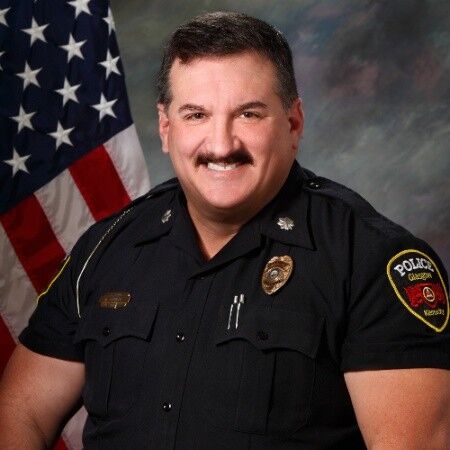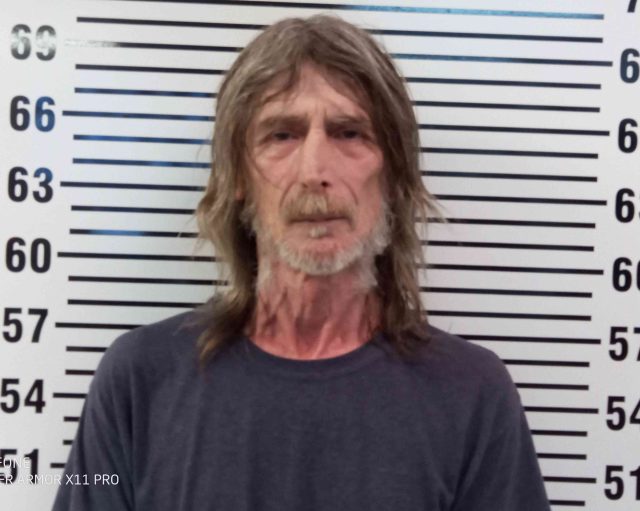Vision of afterlife varies by faith
Published 12:00 am Friday, November 18, 2011

- Alex Slitz/Daily NewsBowling Green artist Jonahs Coel, a Western Kentucky University student, sits among pieces of his installation called “Abandonment of the Sickly Fetch,” which will be displayed from 7 p.m. to 10 p.m. Saturday at Kereiakes Park.
What really happens when we die? There’s a plethora of different views: Some believe in heaven and hell. Some believe in reincarnation. Others believe that nothing happens at all.
The death of Apple co-founder Steve Jobs has sparked inquiries into the man’s life, including his faith. His last words – “Oh wow. Oh wow. Oh wow,” according to reports – have prompted a national discussion on the afterlife.
It’s a sensitive, personal subject, and many have their own ideas about what happens after death. As an increasingly diverse city, Bowling Green is home to people of many faiths, and they have varying beliefs when it comes to the afterlife.
The following accounts are from local people who affiliate with each religion; they do not necessarily represent that religion’s doctrine or beliefs of others who adhere to that religion.
Islam
The afterlife is both a hopeful and scary thought for Muslims. It’s happy for those who believe they will go to paradise, a beautiful place that’s better than anyone can imagine.
But some Muslims fear the possibility that they could be sent to hell, a twisted place that’s consumed in fire, snakes, constant suffering and horrific smells, said Imam Sedin Agic of the Islamic Center of Bowling Green.
An estimated 5,000 to 6,000 Muslims live in Bowling Green, and most have their hopes set on paradise, according to the center.
“If I believe in God, which is very important, in angels … I hope through my actions I go to paradise,” Agic said. “If I am bad, there is no hope.”
When people die, they go to a place called al-barzakh, where they wait until judgment day. On that day, everyone’s body will rise from the grave and stand before God.
Some will be sent to the top tier of heaven, and others will be sent to the lowest level of hell. Some will get a light punishment – so their feet might be in hell, but their minds will float to paradise, Agic said.
Others will literally fuel the fire. Their skin will regenerate after it burns, so it’s constantly on fire. Their bones will break. Snakes will chew on them. They will be thirsty, but can only drink dirt. They will be hungry, but can only eat cactuses, Agic said.
“You feel it in your bones,” he said. “It’s a very strong fire. It’s very black, and it’s a very bad smell.”
But in paradise, people feel no pain. There will be no sorrow and no sickness. Each person has at least one servant, which is where the concept of heavenly virgins comes from. Both men and women can have several virgins, which give the person whatever they ask for, Agic said.
Atheism
Claudia Hanes believes that people should live a good life and try to make the world a better place. Then, we die.
“In terms of the afterlife, I don’t think there is one,” said Hanes, a member of the Unitarian Universalist Church in Bowling Green. “Basically, I feel that we have one life, and this is it.”
Hanes calls herself a humanist atheist. She’s been on a spiritual journey the majority of her life. She once was a Christian; she grew up in a Presbyterian church, then joined a Baptist church. Eventually, she adopted the belief that we’re here for a brief moment, and we should live a quality life, she said.
“I think when we die, we die,” she said. “The science is basically we will deteriorate no matter what we’re buried in.”
Hinduism
Vikram Patel believes in God, but the afterlife is another matter. As a Hindu, the Bowling Green man was raised to believe that life doesn’t really end.
The body dies, but Hindus believe the soul lives on and is reborn into another life form. Life is a cycle, a process called reincarnation, said Patel, a local pharmacist. Patel is one of several Hindus in Bowling Green – an estimated 300 Western Kentucky University students are from India, though that doesn’t mean they are all Hindu.
“It’s a lifelong process,” he said. “I know I’m going to be reborn again.”
There are 84,000 different forms a soul can take once it’s reincarnated. The best form is the human body, and it’s unclear what the lowest is, although souls can come back as animals, plants or insects, Patel said.
People’s actions determine how their souls reincarnate, a concept called karma. So a good person might come back as another human, while a bad person could become an insect. Souls do not remember their past life, Patel said.
Someone can stop reincarnating, but it’s extremely rare. That person would have to be totally connected to God through meditation, with no other affections or commitments. That person goes on to merge with God, who Patel calls Brahman, the creator.
“You are done. You have found a place in God’s home,” he said. “My hope is I don’t harm anybody; I do good deeds, and hopefully in my later years, I can devote myself to God.”
Latter-day Saints
Mormons believe that nearly everyone goes to heaven, but it’s not that simple. There are three levels of heaven, and before people go there, they wait in either spirit paradise or spirit prison, according to Bishop Michael Smith, of the local Church of Jesus Christ of Latter-day Saints.
An estimated 700 people are members of the Bowling Green LDS church. Like some other faiths, Mormons believe that a person doesn’t directly go to heaven after death – they must wait until God resurrects them from the grave.
During that waiting time, they either go to spirit paradise or spirit prison. Those who are good and faithful go to paradise, while people who are wicked and ungodly go to prison, Smith said.
After resurrection, a person is judged by God and sent to one of three levels of heaven: celestial – the highest level – followed by telestial and terrestrial.
Terrestrial is the first level, where people basically live the way they do now – like earth in heaven. On the second level, people get to have contact with Jesus, and the highest level allows people to be with both Jesus and God the Father, said Bishop Paul Cofoid, of the local church.
To get to the highest kingdom, a person must make a commitment to God through rituals performed by someone in the priesthood. The first ritual is baptism and the last is called sealing, when a husband and wife are married for eternity, Smith said.
Methodist
Does the afterlife exist? Yes. Is it clear what the afterlife is? Not really.
While the Bible is specific about heaven and hell, the concepts are not necessarily what many Christians picture them to be, said Adam Shourds, executive pastor at Broadway United Methodist Church in Bowling Green.
“When the Bible talks about heaven, we don’t know it’s everything we think it means, escalators going up and angels,” he said. “All of those are metaphors to describe something we can’t understand.”
The concept of hell is even fuzzier. The metaphor of fire and brimstone is helpful, because it describes a very painful state. Both heaven and hell exist in the human world and in the afterlife, and people who reject God are subject to a living hell, or torture while living on earth. In fact, Jesus was very concerned with people treating one another badly while alive, Shourds said.
“For Christians, the simplest way is we follow Jesus,” he said. “We accept the grace that’s been offered to us through Christ and then spend the rest of our lives living out that relationship.”
Judaism
Some believe people return to God when they die, while others think the soul waits in the grave for the savior. Others think humans simply decompose.
It’s a string of different beliefs that make up one religion: Judaism, according to Bryan Carson, board member of Am Shalom, a local Jewish congregation.
“Basically, there are a lot of different views, and that’s why it’s so complex,” Carson said. “Judaism doesn’t have a central authority that makes doctrine, so it has many different beliefs on the same subject.”
One idea is that a part of each person comes from God, and so when we die, we return to God. Another belief emphasizes the messiah, or savior. While Christians believe the messiah is Jesus Christ, many Jews believe the savior has yet to come. And when the messiah comes, some Jews believe bodies will be resurrected from their graves and live again, Carson said.
“Heaven and hell are not really Jewish concepts, so we don’t have that,” he said. “But the concept of bodily resurrection is that physically your body will be resurrected so that you would live again, but on earth.”
Others believe that nothing happens, that bodies simply rot. Some cling to the idea that people live on through their children. As for Carson, he and others believe that people continue to live, even after death, through their actions, their deeds and their impact on the world, he said.
“There is this emphasis on what we do, but it’s not so we can go to heaven,” he said. “It’s so we can bring (the world) closer to a period of peace.”
Catholicism
It’s a mysterious concept, but anyone can find glimpses of the afterlife when looking in the Christian holy book, the Bible. Though they are not necessarily physical places, heaven and hell are very real, said the Rev. Joshua McCarty, of St. Joseph Catholic Church in Bowling Green.
In the Book of Revelation, for example, one passage depicts a scene of angels bowing down and people being drawn up in ecstasy. The Lamb of God is seated on a throne, and people are falling down in worship. There are songs and instruments and complete adoration, McCarty said.
“So, as a Catholic, that gives us a sense of what heaven is like,” he said.
But souls do not necessarily directly ascend to heaven after death. Many must be purified before meeting God face to face – it’s a process called purgatory. And there’s also the belief that when Jesus Christ comes to earth again, souls that have gone on will reunited with their bodies, he said.
When Catholics are baptized into the church, they are expected to live by a certain moral code, which has something to do with getting to heaven.
“But it ultimately is the mercy of God that allows one into heaven,” McCarty said.
On the other hand, some go to hell. In hell, people’s earthly desires remain the same. For example, if someone is a traitor, he will still betray in hell. But he will soon discover that his deeds are wicked, McCarty said.
“Our beliefs are that hell is real. That it’s undesirable and is wretchedly horrible,” he said.






